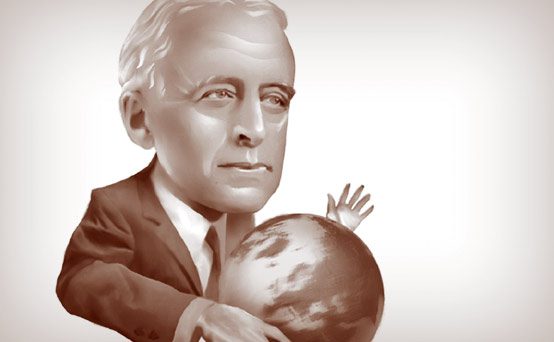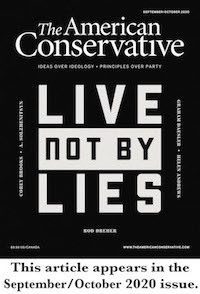The Moral Roots Of Our Foreign Policy Crisis
A new analysis of Irving Babbitt suggests that our wars are weaved into the moral fabric of our society.

On my shelf sits a single green book, thick and intimidating—I haven’t opened it in years, if only because I keep lazily skipping over it in favor of slimmer volumes. It is Democracy and Leadership by Irving Babbitt, with a foreword by Russell Kirk, natch. Back more than a decade ago, during my undergraduate studies at the Catholic University of America, Democracy and Leadership was a seminal text. This was thanks largely to my professor, Dr. Claes Ryn, a contributor to TAC and one of several scholars who helped revive and proliferate Babbitt’s work during the 1970s.
Babbitt is one of the most influential yet neglected conservative intellectuals of the 20th century, a kind of missing link between Edmund Burke and Russell Kirk. Now William S. Smith, a Catholic University contemporary of Ryn’s, has written a new study of Babbitt called Democracy and Imperialism. It examines Babbitt’s views on foreign policy, a worthy calling during times such as these. The United States is currently bogged down in imperial entanglements all over the world: occupying Iraq and Afghanistan, patrolling South Korea, and even keeping watch over Germany. Smith argues not only that Babbitt would have viewed such a sprawling empire as a clear departure from the American constitutional tradition, but that he’d diagnosed it a century earlier.
Babbitt did not seem, at least from his résumé, destined to become an essential conservative political thinker. His first love was romance languages, which he taught at Williams College before being offered a position at Harvard. There he became a professor of French literature and went on to exert great influence over Harvard’s literary program. Yet he’s best remembered today for his contributions to politics, and especially what he called his New Humanism. At the core of his teachings was the belief that the anthropological was the political, that you had to know the human heart in order to understand how to govern. The enemy, then, was any false—any dangerously Romantic—conception of the individual, which risked laying a counterfeit foundation for a polity or theory of politics.
For Babbitt, the human person was dualistic, divided between a higher self and a lower self. Virtue consisted of mastering the lower self, taming one’s appetites and baser desires through what Babbitt called the “inner check.” This inner check was like a veto power: “No more fundamental distinction perhaps can be made,” Babbitt wrote, “than that between those who associate the good with the yes-principle and those who associate it rather with the no-principle.” Virtue wasn’t something positive and affirming; it was a roadblock, a hand held firmly aloft. Saying no required willpower, and for this reason Babbitt viewed the will as the supreme element of the human person. He ascribed great importance also to the imagination and reason. But the will adjudicated over both; only it could determine whether the other components were used morally.
This inner moral mastery, this tending of one’s own garden, was the basis of Babbitt’s New Humanism. And while its blueprint can be found in Christian moral teaching, Babbitt was ultimately syncretic, locating it also in Hindu and Buddhist thought. This elicited criticism from some, including his former student T.S. Eliot, who thought him insufficiently grounded in Christianity. Babbitt, in turn, expressed contempt for mindless religious fanaticism both right and left, writing, “It may be said of the ultramontane Catholic, as of the extreme partisan of grace, though in a very different sense, that he has simply repudiated self-reliance.” The self, the individual, was essential for Babbitt; assimilating it into a single church or doctrine or tribe wasn’t enough. Only through cultivation from within could virtue ultimately be achieved.
How does all this relate to the American founding? Just as the inner check tempered the self, Babbitt viewed the mechanisms of the U.S. Constitution as tempering the passions of the people. Careful and deliberating institutions such as the Senate acted as a cooling saucer; good leadership across all strata of power shaved the rough edges off of the national will. From virtuous and restrained men could come virtuous and restrained statecraft, with the individual a microcosm of government itself. Yet two interlopers had recently crept in. One Babbitt called scientific naturalism, which he saw as a legacy of Francis Bacon. The other he labeled sentimental humanism, whose forefather was Jean-Jacques Rousseau.
This was a curious tag team. Bacon and Rousseau are often placed in opposition to each other, one a studied creature of the Enlightenment, the other that era’s self-appointed demolition man. Yet Babbitt saw the former as giving birth to the latter. The effect of scientific naturalism was to replace the tenets of morality with the tenets of science. This relocated virtue from within the self to outside of it, negating that all-important inner check. From there, Rousseau took this innovation and ran. With vice firmly external to the human person, Rousseau was able to argue that man was inherently good. It was the institutions around him that were responsible for his corruption. Society, not sin, was the real foe.
As Babbitt put it, “The Rousseauist is ever ready to discover beauty of soul in anyone who is under the reprobation of society.” Thus while Bacon’s scientism wasn’t necessarily destructive in and of itself, the entire point of Rousseau’s sentimentalism was to rebel and destroy. Smith notes that Babbitt saw Rousseau as a turning point in intellectual history, a figure of almost religious import. What Rousseau did was to replace the previously repugnant Judeo-Christian morality with something softer, premised on fellow-feeling and pity, exalting the uncorrupted and uninitiated individual over his blackened surroundings. Rousseau’s ideal was the so-called noble savage, the perfectly virtuous man living outside of civilization.
This meant turning upside-down institutions like schools and churches. It also meant a broader revolution in political thought, tearing down the society one lived in and starting from scratch. This, of course, is exactly what the French revolutionaries tried to do. Influenced by Rousseau, they anointed themselves the inhabitants of Year One and set about overhauling everything from their national holidays to their calendar. Babbitt is thus firmly in the tradition of conservative thinkers who reacted against the Jacobins, treating them as a bloodstained antithesis. And it’s here that a distinction about democracies comes into play. Proper constitutional democracies, like America’s, Babbitt thought, survive because they check the national will, while absolute Rousseauian democracies like that of revolutionary France do no such thing, thinking the numerical majority to be the sine qua non of governance.
Babbitt wrote:
The contrast that I am establishing is, of course, that between constitutional and direct democracy. There is an opposition of first principles between those who maintain that the popular will should prevail, but only after it has been purified of what is merely impulsive and ephemeral, and those who maintain that this will should prevail immediately and unrestrictedly.
Opt for the latter and Babbitt worried you would get big government, a loss of liberty, decadence, and imperialism.
This is the Babbitt syllabus, familiar to his aficionados (the few, the proud), and Smith does a fine job of laying it all out. Where his book really shines is in taking this reasoning and applying it to America’s senseless foreign policy. Our empire, Smith thinks, is not a mere byproduct of a couple of decades of bad policymaking. It is, rather, more deeply rooted, a consequence of Bacon’s and Rousseau’s moral revolutions. Somehow our foreign policy has become akin to the French Revolution at the end of the drone.
♦♦♦
What haunts Ryn’s and Smith’s little quarter at the Catholic University of America isn’t just that this empire of intemperance exists; it’s that it stems from deeper moral ills. What if our wars aren’t just some elite neoconservative project but a reflection of  our moral personality? What if ending them means not just voting the bums out but adjusting our very national temperament? All the way back in 2006, Ryn warned in an essay that “the emerging ruling class…is made up increasingly of persons used to having the world cater to them.” “Call this the imperialistic personality,” he wrote, “if ‘spoilt brat’ sounds too crude.” This personality, what both Ryn and Smith call the “neo-Jacobin,” has lost that all-important inner check. The result is a petulant narcissism, a Rousseuian expectation that the world should conform to personal demands rather than the other way around. Out of this grew the notion that America could bend Iraq to its will, that it could even “rid the world of evil,” as George W. Bush put it.
our moral personality? What if ending them means not just voting the bums out but adjusting our very national temperament? All the way back in 2006, Ryn warned in an essay that “the emerging ruling class…is made up increasingly of persons used to having the world cater to them.” “Call this the imperialistic personality,” he wrote, “if ‘spoilt brat’ sounds too crude.” This personality, what both Ryn and Smith call the “neo-Jacobin,” has lost that all-important inner check. The result is a petulant narcissism, a Rousseuian expectation that the world should conform to personal demands rather than the other way around. Out of this grew the notion that America could bend Iraq to its will, that it could even “rid the world of evil,” as George W. Bush put it.
It’s past time we examined the moral roots of our foreign policy crisis, and Smith’s book is a valuable guide to doing so. But can any of this be corrected? Donald Trump was elected on a mandate to stop these endless wars and bring the troops home, a project at which he’s more often failed than succeeded. Still, his ascent has led many to conclude that America is at last closing the curtain on the Bush era. Around Trump has risen a new generation of nationalists who argue that the troops need to be brought home, that our muscles should be flexed domestically rather than abroad. These thinkers take as their mantra “America First,” in contradistinction to the more globalist approach of the Bush administration, which seemed to view every country as a potential U.S. charity case.
Yet ever the skunk at the garden party, Smith has one last piece of bad news: Rousseau was a nationalist too. Out of his extreme individualism came an extreme collectivism, with the human person wholly subordinated to the national will. And while today’s nationalists don’t go anywhere near that far, most of them want to save American institutions rather than tear them down, it’s worth asking: did Trump emerge out of the same moral puddle as our wars? Is the president himself a neo-Jacobin? Are we still in the midst of our revolutionary fever? Is the mood really that different than it was in 2003? We likely won’t know for many years, until Trump departs and we can tease out the nuances of his legacy with cooled passions. In the meantime, both Babbitt and Smith will continue to beckon off the shelf, full of unsettling truths in an unsettling year.


0 Comments:
Post a Comment
Subscribe to Post Comments [Atom]
<< Home